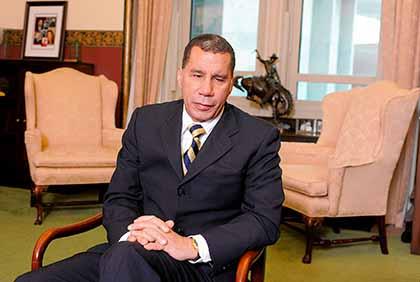By Anna Gustafson
Gov. David Paterson last week vetoed legislation widely supported by officials from Queens and other parts of the city that would have placed a temporary ban on a controversial drilling technique near the city’s upstate watershed. At the same time, the governor also issued an executive order that implements a moratorium on a certain type of drilling until July — later than what the state Legislature had mandated.
Paterson Saturday vetoed the bill that would have placed a moratorium until May 15 on any new permits for companies that wanted to use hydraulic fracturing, known as hydrofracking, which injects water laced with chemicals into the ground when drilling for natural gas.
City Councilman James Gennaro (D-Fresh Meadows), chairman of the Council Environmental Protection Committee, state Assemblyman Andrew Hevesi (D-Forest Hills), state Sen. Joseph Addabbo (D-Howard Beach), Mayor Michael Bloomberg, Council Speaker Christine Quinn (D-Manhattan), the city Department of Environmental Protection and a host of others have expressed concern that hydrofracking could contaminate the city’s water supply, most of which comes from the upstate watershed.
The Legislature’s bill would have temporarily banned both fracking in horizontal wells and vertical wells — which is where Paterson said he disagreed with the legislation. The governor issued an executive order that allows no company to receive a permit to use hydraulic fracturing in horizontal wells until July 1, later than the date set by the Legislature, but does permit what Paterson called “more conventional” vertical drilling to continue.
“The governor’s order obviates the need for a moratorium on high-volume fracking,” Peter Kiernan, counsel to the governor, said in a prepared statement. “However, vertical drilling has been a fact in this state for 40 years without demonstrable environmental damage. Permitting for such drilling will continue unless the [Department of Environment Conservation’s] comprehensive review requires it to be stopped.”
Paterson in his executive order required the state DEC to “intensify” its analysis of horizontal hydrofracking in an effort to conclude whether the state should allow that type of drilling to occur at all.
“The governor emphasized that there must be absolutely no doubt that high-volume fracking is safe,” Kiernan said. “The enormous revenues that could eventuate from such drilling would not be worth the cost of serious environmental harm.”
The state DEC has said one of the primary differences between horizontal drilling and vertical drilling is that there are larger rigs that drill for longer periods of time in horizontal drillings.
According to a report prepared by Manhattan Borough President Scott Stringer, seven states in the country have experienced serious incidents of water contamination and explosions near sites where companies have used hydraulic fracturing, which entails injecting up to 5 million gallons of water laced with chemicals into the ground at high pressure to break the rock.
Gennaro and Quinn have said it is crucial for the state to ban hydrofracking.
“As accounts of contaminated water, soil and air due to hydraulic fracturing come in from across the country, New York is in a unique position to show much-needed leadership on this issue,” Gennaro and Quinn said in a joint statement.
A 2008 report from the U.S. Land Management Bureau said groundwater in Sublette County, Wyo., which has one of the country’s largest natural gas fields and where hydraulic fracturing was commonly employed, was contaminated with benzene, a substance that has been linked to cancer and nervous system disorders.
Reach reporter Anna Gustafson by e-mail at agustafson@cnglocal.com or by phone at 718-260-4574.






























